Are you considering upgrading your roof to something that’s durable, attractive, and can stand the test of time? Then you’ve likely come across stone coated roofing tiles. These roofing materials combine the robustness of metal with the aesthetics of traditional tiles, offering a mix of style and functionality that’s hard to beat.
But what exactly are stone coated roofing tiles? How do they work, and why should you consider them over other roofing materials? In this detailed guide, we’ll dive deep into everything you need to know about stone coated roofing tiles—from the different types available, how they’re made, their benefits, and even how to maintain them.
What Are Stone Coated Roofing Tiles?
Stone coated roofing tiles are metal roofing panels coated with stone chips. The metal base—often made from steel—provides durability, while the stone coating offers aesthetic appeal and protection against the elements. Unlike traditional roofing materials like asphalt shingles or clay tiles, stone coated tiles offer both the lightweight characteristics of metal roofing and the charming look of more conventional materials.
Why Are They Popular?
In recent years, stone coated roofing tiles have become increasingly popular due to their balance of form and function. They offer:
- Durability: These tiles can last for decades, resisting weathering, impact, and even fire.
- Aesthetic Flexibility: You can achieve almost any look, whether you want a Mediterranean-style home or something more modern.
- Low Maintenance: Once installed, they require little upkeep compared to other types of roofing.
Now, let’s dive into the specifics, starting with the materials and types of stone coated roofing tiles.
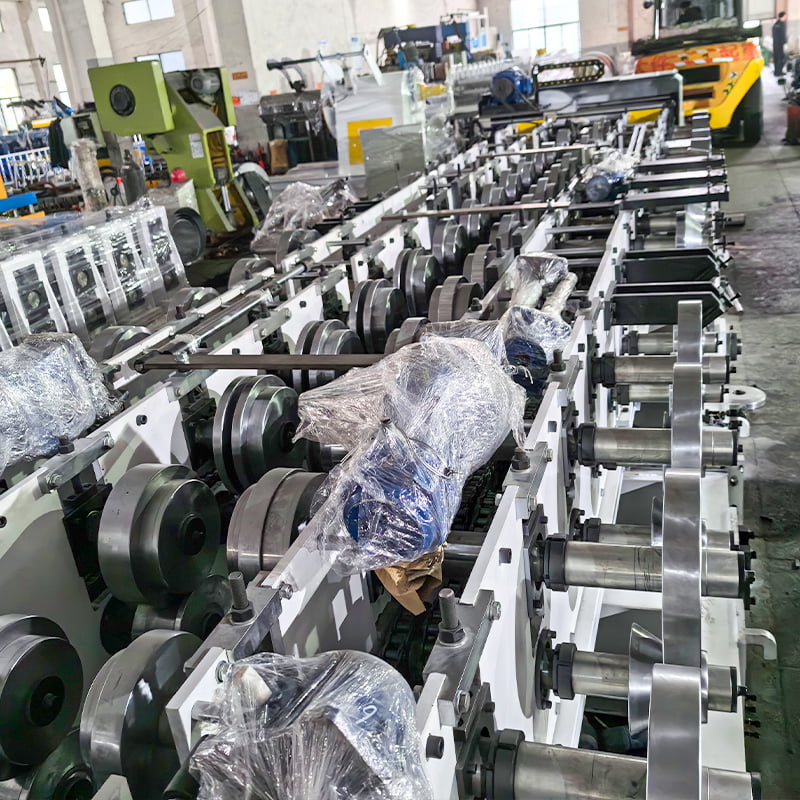
A Popular Alternative to Stone Coated Roofing Tiles
Before diving into the details of stone coated roofing tiles, it’s worth briefly discussing corrugated iron sheets, another popular roofing option. Corrugated iron is favored in areas where budget-friendly, durable roofing is a priority. They are made from galvanized steel or aluminum and have a ridged appearance, which adds to their structural strength. But, when compared to stone coated tiles, corrugated iron sheets often fall short in terms of aesthetics and soundproofing. While durable, they lack the refined, high-end look of stone coated tiles and are more prone to noise during rainstorms.
Corrugated Iron Sheets vs. Stone Coated Roofing Tiles:
- Durability: Both are highly durable, but stone coated tiles offer better longevity due to the added protection from the stone coating.
- Noise Reduction: Corrugated iron sheets can be noisy in rain, while stone coated tiles have a sound-dampening effect thanks to the stone granules.
- Appearance: Stone coated tiles offer a more refined, traditional look, whereas corrugated iron sheets have an industrial appearance.
- Price: Corrugated iron sheets are often cheaper upfront but may require more maintenance over time.
Types of Stone Coated Roofing Tiles
Stone coated roofing tiles come in various styles and models, each with unique properties. Below is a comprehensive guide to some of the most popular models, highlighting their features and advantages.
| Tile Model | Description | Best Use |
|---|---|---|
| Classic Profile | Mimics the look of traditional clay or concrete tiles but offers the durability of metal. | Mediterranean-style homes |
| Shake Profile | Designed to look like wooden shakes, giving your home a rustic and natural appearance. | Country-style houses or cabins |
| Shingle Profile | Offers a more modern, flat look with a sleek appearance. | Modern, contemporary homes |
| Barrel Vault Profile | A curved profile that resembles terracotta tiles commonly found on Spanish-style homes. | Spanish or Southwestern-style homes |
| Tile Profile | This type replicates the look of traditional asphalt shingles but with added durability. | Urban homes looking for a standard, yet durable roof |
| Roman Profile | Features a large, rounded design that mimics ancient Roman tiles, providing a regal, historic look. | Villas and luxury homes |
| Tudor Profile | A unique blend of flat and curved sections, mimicking classic European roofs. | Historical or cottage-style homes |
| Slate Profile | Emulates the natural look of slate tiles, offering a refined, elegant finish. | High-end homes |
| Antique Profile | This profile gives off a weathered, classic appearance, ideal for homeowners wanting an aged look. | Renovated historical homes |
| Modular Tile Profile | A highly customizable profile that allows for unique configurations based on design preferences. | Custom homes with unique architectural needs |
-
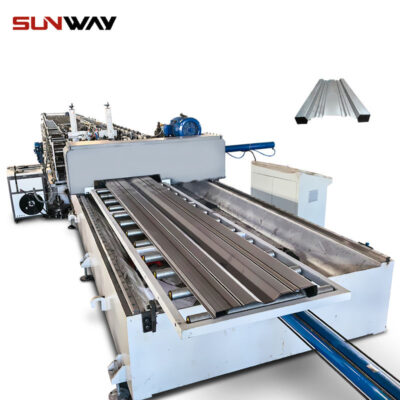 Carriage Board Roll Forming Machine
Carriage Board Roll Forming Machine -
 Highway Guardrail End Terminal Forming Machine
Highway Guardrail End Terminal Forming Machine -
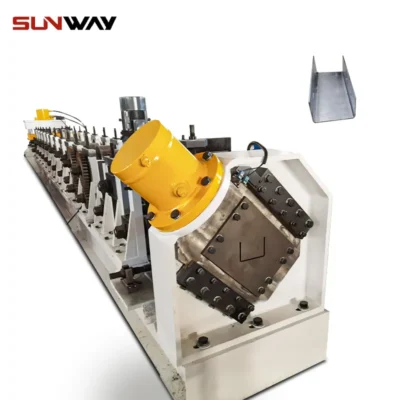 Highway U/C Post Roll Forming Machine
Highway U/C Post Roll Forming Machine -
 2 Waves Highway Guardrail Roll Forming Machine
2 Waves Highway Guardrail Roll Forming Machine -
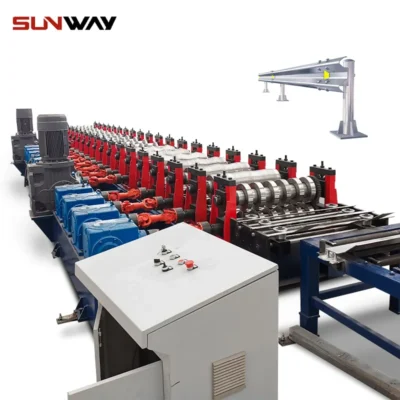 3 Waves Highway Guardrail Roll Forming Machine
3 Waves Highway Guardrail Roll Forming Machine -
 Electrical Cabinet Frame Roll Forming Machine
Electrical Cabinet Frame Roll Forming Machine -
 Din Rail Roll Forming Machine
Din Rail Roll Forming Machine -
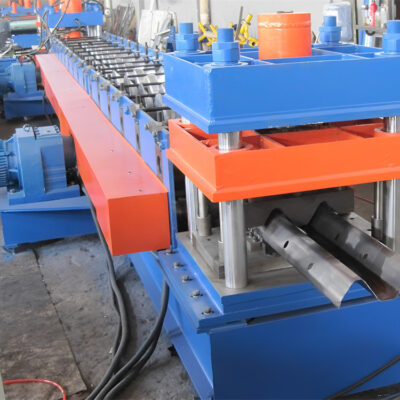 Two waves highway guardrail machine
Two waves highway guardrail machine -
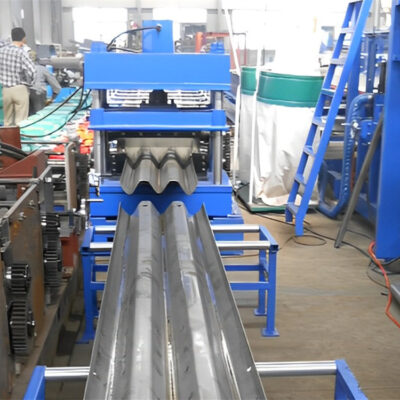 Three waves highway guardrail machine
Three waves highway guardrail machine
How Stone Coated Roofing Tiles Are Made
Stone coated roofing tiles go through a meticulous manufacturing process to ensure both durability and aesthetic appeal. Here’s a breakdown of how these tiles are typically made:
- Metal Base Creation: The process starts with creating the metal base, usually made from galvanized steel or aluminum. The metal is pressed into the desired shape, such as shingle or tile profiles.
- Coating Application: After forming the metal, a coating of acrylic or other adhesive material is applied.
- Stone Chip Layer: Next, the stone chips (typically made from natural materials like granite) are applied to the adhesive-coated metal. These chips are what give the tiles their signature appearance and extra durability.
- Baking and Curing: The tiles are then baked to harden the coating and ensure that the stone chips are firmly attached.
- Final Sealing: Finally, the tiles are sealed with a protective layer to further prevent weathering and corrosion.
This process results in a roofing material that combines the strength of metal with the aesthetic versatility of stone.
Key Components of Stone Coated Roofing Tiles
| Component | Function |
|---|---|
| Steel Base | Provides the strength and structure of the tile. |
| Acrylic Coating | Protects the steel base and provides an adhesive layer for the stone chips. |
| Stone Chips | Adds durability, weather resistance, and aesthetic appeal to the tile. |
| Protective Sealant | Offers an additional layer of protection from UV rays, rain, and other weather conditions. |
| Baked Finish | Hardens and strengthens the entire tile for maximum durability. |
Working Process of Installing Stone Coated Roofing Tiles
The installation process of stone coated roofing tiles involves several steps to ensure proper fit and durability. Let’s walk through the steps:
- Surface Preparation: Before installation begins, the roof’s surface must be properly prepared. This involves removing old roofing materials and inspecting the roof decking for damage.
- Underlayment Installation: A waterproof underlayment is applied to protect the roof from water damage.
- Laying the Tiles: The tiles are installed in overlapping rows, starting at the bottom of the roof and working upward.
- Securing the Tiles: Special nails or screws are used to secure the tiles to the roof decking, ensuring they can withstand wind and other harsh weather conditions.
- Trimming and Sealing: The final step is to trim any excess tile material and seal the edges to prevent water infiltration.
Key Installation Tools and Techniques
| Tool | Function |
|---|---|
| Tile Cutter | Used to cut tiles to fit the edges and corners of the roof. |
| Roofing Nails/Screws | Fastens the tiles securely to the roof decking. |
| Underlayment | Provides a waterproof layer between the roof decking and tiles. |
| Sealant | Seals the edges and corners to prevent water infiltration. |
Machine Speed and Efficiency in Tile Production
The production process for stone coated roofing tiles requires specialized machines, capable of high-speed output to meet industry demands. The machine efficiency plays a significant role in determining production speed and cost.
| Machine Type | Speed (Tiles per Minute) | Efficiency (%) |
|---|---|---|
| Tile Press Machine | 10-15 | 95% |
| Coating Machine | 8-10 | 90% |
| Stone Chip Applicator | 7-12 | 92% |
| Baking and Curing Oven | N/A | 85% |
Customized Mechanical Parameters for Stone Coated Roofing Tiles
Stone coated roofing tiles can be customized to meet specific architectural or aesthetic requirements. This involves adjusting mechanical parameters such as thickness, weight, and coating type.
| Parameter | Description | Range |
|---|---|---|
| Tile Thickness | The overall thickness of the tile, including the metal base and stone coating. | 0.4mm – 0.6mm |
| Tile Weight | The weight of each tile, affecting roof load and installation requirements. | 2.5 kg – 3.5 kg per tile |
| Stone Coating Type | The type of stone coating used, including granite, basalt, or synthetic materials. | Granite, Basalt, Synthetic |
| Metal Base Material | The type of metal used for the base, typically galvanized steel or aluminum. | Galvanized Steel, Aluminum |
| Color Options | Available colors to match aesthetic preferences. | Red, Green, Black, Gray, Custom Colors |
Applications and Uses of Stone Coated Roofing Tiles
Stone coated roofing tiles are highly versatile and can be used in various types of buildings. Their durability and customizable appearance make them suitable for both residential and commercial structures.
| Application | Description |
|---|---|
| Residential Homes | Ideal for single-family homes, providing a stylish and durable roofing option. |
| Commercial Buildings | Used on office buildings, malls, and other commercial spaces that require long-lasting roofing. |
| Historical Renovations | Perfect for restoring older buildings while maintaining an authentic appearance. |
| Coastal Areas | Ideal for homes near the coast, offering corrosion resistance due to the metal base and coating. |
| Cold Climates | Excellent for snowy regions, as the tiles are durable and resistant to cracking from freezing. |
Installation, Operation, and Maintenance of Stone Coated Roofing Tiles
Proper installation and maintenance of stone coated roofing tiles are essential for ensuring their longevity and performance. Below is a guide on installation, operation, and routine maintenance tasks.
| Task | Description |
|---|---|
| Installation | Installing tiles in overlapping rows with appropriate fasteners. |
| Routine Inspection | Inspect tiles annually for signs of damage or wear. |
| Cleaning | Clean the roof periodically to remove dirt, debris, and algae growth. |
| Re-sealing | Apply sealant to the edges and valleys of the roof every 5-7 years to prevent leaks. |
| Replacing Damaged Tiles | Replace any cracked or damaged tiles as needed to maintain roof integrity. |
Choosing the Right Supplier for Stone Coated Roofing Tiles
Selecting a reliable supplier is crucial for ensuring that you get high-quality roofing materials at a fair price. Here are some factors to consider when choosing a supplier:
| Factor | Description |
|---|---|
| Supplier Reputation | Look for suppliers with a strong reputation for quality and customer service. |
| Price Range | Compare prices from different suppliers to ensure competitive pricing. |
| Warranty | Ensure the supplier offers a robust warranty on the materials. |
| Material Quality | Check the quality of the steel base and stone coating to ensure durability. |
| Delivery and Installation | Consider whether the supplier offers delivery and installation services. |
Supplier Price Range Guide
| Supplier | Price Range per Square Meter |
|---|---|
| Supplier A | $5 – $7 |
| Supplier B | $6 – $9 |
| Supplier C | $7 – $10 |
| Supplier D | $8 – $12 |
Advantages and Disadvantages of Stone Coated Roofing Tiles
When considering stone coated roofing tiles, it’s important to weigh both the advantages and disadvantages.
Advantages
- Durability: These tiles can last for over 50 years with proper care.
- Aesthetic Appeal: You can achieve almost any look, from rustic wood shakes to modern flat tiles.
- Weather Resistance: The metal base and stone coating make these tiles highly resistant to wind, hail, and even fire.
- Low Maintenance: Once installed, they require very little maintenance compared to other roofing materials.
Disadvantages
- Cost: Stone coated roofing tiles are more expensive than some other roofing materials, such as asphalt shingles or corrugated iron sheets.
- Installation Time: These tiles require specialized installation, which can take more time and cost more than simpler roofing options.
- Weight: While lighter than some traditional materials like clay tiles, stone coated roofing tiles are heavier than metal sheets, which may require additional roof support.
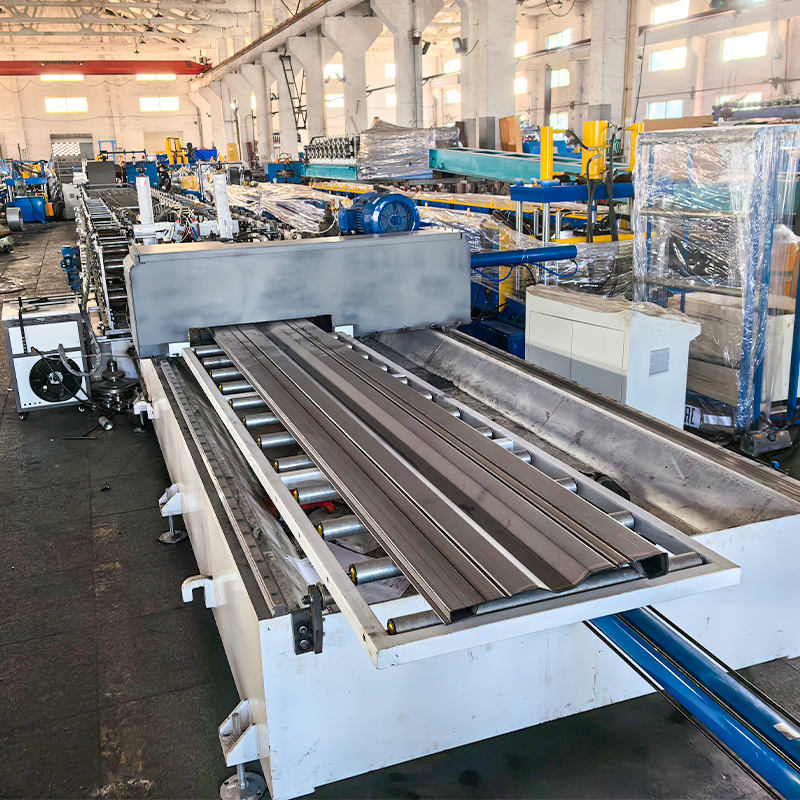
FAQ
| Question | Answer |
|---|---|
| How long do stone coated roofing tiles last? | These tiles can last 50 years or more with proper care and maintenance. |
| Are stone coated roofing tiles noisy? | No, the stone coating helps dampen sound, making them quieter than metal sheets. |
| Can I install stone coated roofing tiles myself? | While possible, it’s recommended to have a professional handle the installation for best results. |
| Are these tiles suitable for all climates? | Yes, they perform well in a wide range of climates, including coastal and snowy regions. |
| Do stone coated roofing tiles add value to a home? | Yes, they increase curb appeal and durability, which can boost home value. |
Conclusion
Stone coated roofing tiles offer a perfect combination of beauty and durability, making them a premium choice for homeowners and builders alike. With various styles, customizable features, and excellent weather resistance, these tiles are an investment in the longevity and aesthetic appeal of your home. While they may come with a higher price tag and require professional installation, their benefits far outweigh the costs, providing you with a roof that can last a lifetime.
If you’re looking for a roofing solution that’s both functional and fashionable, stone coated roofing tiles may be the perfect option for you.
Frequently Asked Questions (FAQ)
1) Do stone coated roofing tiles perform well in high-wind and hail zones?
- Yes. Many products are tested to UL 2218 Class 4 (hail impact) and can meet ASTM D3161/UL 580/UL 1897 wind uplift ratings. Verify the specific product’s test reports for your local code.
2) What’s the typical installed cost per square (100 sq ft) in 2025?
- In North America, $650–$1,050 per square installed depending on profile, underlayment, roof complexity, and region. Materials alone are often $300–$550 per square.
3) How do stone coated metal tiles compare to asphalt shingles on lifecycle cost?
- Although upfront costs are higher, 50-year service life, lower maintenance, potential energy savings, and insurance discounts in hail/wind regions often deliver a lower 30–50 year total cost of ownership.
4) Can stone coated roofing tiles be installed over existing shingles?
- Often yes, with a proper inspection, deck integrity confirmation, and ventilation plan. Some jurisdictions require tear-off—check local codes and manufacturer guidelines.
5) Are the stone chips prone to shedding or fading?
- Quality systems use UV-stable ceramic-coated granules and acrylic binders with oven-curing. Minimal granule loss is normal early on; long-term color stability depends on brand, climate, and maintenance.
2025 Industry Trends for Stone Coated Roofing Tiles
- Cool roof adoption: Higher-SRI stone coated finishes aligned with ENERGY STAR and Title 24 are gaining share for summer peak load reduction.
- Coastal durability: Growing use of aluminum-zinc (AZ150/AZ200) coated steel bases and marine-grade fasteners in cyclone-prone/coastal markets.
- Severe-weather specification: Increased selection of Class 4 impact and high-wind rated systems due to more frequent hail and hurricanes.
- ESG and EPDs: Builders request Environmental Product Declarations; manufacturers report recycled content and embodied carbon per m².
- Faster installs: Panelized modular formats, pre-formed accessories, and screw-gun depth control reduce install hours by 10–20%.
- Digital estimating: AI roof takeoff tools shorten bid cycles and improve material accuracy.
2025 Performance and Market Snapshot
| Metric | 2023 Typical | 2025 Best-in-Class | Impact | Sources |
|---|---|---|---|---|
| Solar reflectance index (light colors) | 55–70 | 70–85 | Cooler roofs, lower AC load | Cool Roof Rating Council (coolroofs.org) |
| Wind uplift rating | 110–130 mph | 150–180+ mph (profile + clip systems) | Greater storm resilience | ICC-ES, UL 1897 |
| Impact resistance | UL 2218 Class 3 | UL 2218 Class 4 | Insurance discounts possible | UL (ul.com) |
| Average installed cost (per square) | $600–$950 | $650–$1,050 | Budget planning | Industry dealer surveys |
| Embodied carbon (kg CO2e/m²) | 13–18 | 10–14 (recycled steel + efficient curing) | Lower lifecycle footprint | EPDs; World Steel Association |
| Warranty (transferable) | 30–50 yrs | 50 yrs–lifetime (limited) | Long-term value | Manufacturer literature |
Authoritative references:
- Cool Roof Rating Council: https://coolroofs.org
- UL Standards (UL 2218, UL 1897): https://www.ul.com
- ICC Evaluation Service: https://icc-es.org
- ENERGY STAR Roof Products: https://www.energystar.gov
- World Steel Association LCA: https://worldsteel.org
Latest Research Cases
Case Study 1: Cool-Rated Stone Coated Roof Cuts Peak Cooling Load (2025)
- Background: A 2,800 ft² home in Phoenix, AZ, sought to reduce summer energy bills without changing architectural aesthetics.
- Solution: Installed high-SRI stone coated roofing tiles (SRI 78), synthetic breathable underlayment, and ridge-to-eave ventilation upgrade.
- Results: Smart meter data showed 11–14% reduction in peak-hour HVAC energy June–September; attic temperatures dropped 6–9°C; simple payback estimated at 7.8 years versus mid-grade asphalt baseline.
Case Study 2: Hail-Resistant Retrofit for Logistics Facility (2024)
- Background: A 9,500 m² distribution center in the U.S. Midwest faced repeated hail damage to conventional metal sheets.
- Solution: Retrofitted with UL 2218 Class 4 stone coated steel tiles over new deck underlayment; upgraded fasteners to corrosion-resistant screws; added eave ice-barrier.
- Results: Insurance premium credit of 6%; no recorded damage after two subsequent hail events (up to 38 mm hail); maintenance tickets decreased by 72% year-over-year.
Expert Opinions
- Dr. David Dodge, Materials Scientist, Oak Ridge National Laboratory
- Viewpoint: “Ceramic-coated granules on metal substrates can deliver both solar reflectance and abrasion resistance, enabling durable cool roofs in hot climates.” Source: https://www.ornl.gov
- Jenny Reid, Technical Director, Metal Roofing Alliance
- Viewpoint: “Correct fastener selection and ventilation detailing are as critical as tile quality; most callbacks trace to underlayment laps, flashings, and fastener corrosion in coastal zones.” Source: https://www.metalroofing.com
- Prof. Paulo B. Lourenço, University of Minho, Structural Engineer
- Viewpoint: “Lightweight, interlocking stone coated tiles reduce seismic mass while maintaining diaphragm integrity—beneficial in moderate seismic regions.” Source: https://www.uminho.pt
Practical Tools/Resources
- Cool Roof product directory (SRI, reflectance): Cool Roof Rating Council — https://coolroofs.org/directory
- Metal Roofing Alliance homeowner guides and contractor locator: https://www.metalroofing.com
- ENERGY STAR roofing resources: https://www.energystar.gov/products/building_products/roof_products
- Roofing takeoff and estimating: Hover — https://hover.to; EagleView — https://www.eagleview.com
- Wind/hail ratings and code compliance: ICC-ES Reports — https://icc-es.org; UL Product iQ — https://productiq.ulprospector.com
- Environmental Product Declarations (EPDs) search: EC3 Tool — https://buildingtransparency.org/ec3
Last updated: 2025-10-27
Changelog: Added 5 focused FAQs; inserted 2025 trends with performance/cost table and sources; provided two recent case studies; included expert viewpoints; compiled practical tools/resources with authoritative links
Next review date & triggers: 2026-04-30 or earlier if new UL/ICC test data is released, regional codes update wind/hail requirements, or average installed costs shift by >10%
